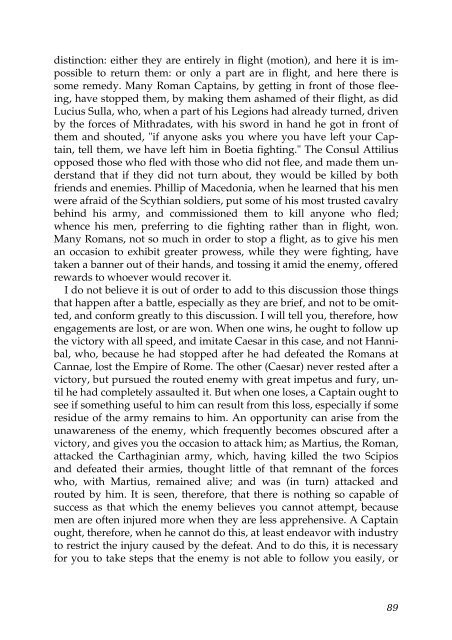Create successful ePaper yourself
Turn your PDF publications into a flip-book with our unique Google optimized e-Paper software.
distinction: either they are entirely in flight (motion), and here it is impossible<br />
to return them: or only a part are in flight, and here there is<br />
some remedy. Many Roman Captains, by getting in front <strong>of</strong> those fleeing,<br />
have stopped them, by making them ashamed <strong>of</strong> their flight, as did<br />
Lucius Sulla, who, when a part <strong>of</strong> his Legions had already turned, driven<br />
by the forces <strong>of</strong> Mithradates, with his sword in hand he got in front <strong>of</strong><br />
them and shouted, "if anyone asks you where you have left your Captain,<br />
tell them, we have left him in Boetia fighting." <strong>The</strong> Consul Attilius<br />
opposed those who fled with those who did not flee, and made them understand<br />
that if they did not turn about, they would be killed by both<br />
friends and enemies. Phillip <strong>of</strong> Macedonia, when he learned that his men<br />
were afraid <strong>of</strong> the Scythian soldiers, put some <strong>of</strong> his most trusted cavalry<br />
behind his army, and commissioned them to kill anyone who fled;<br />
whence his men, preferring to die fighting rather than in flight, won.<br />
Many Romans, not so much in order to stop a flight, as to give his men<br />
an occasion to exhibit greater prowess, while they were fighting, have<br />
taken a banner out <strong>of</strong> their hands, and tossing it amid the enemy, <strong>of</strong>fered<br />
rewards to whoever would recover it.<br />
I do not believe it is out <strong>of</strong> order to add to this discussion those things<br />
that happen after a battle, especially as they are brief, and not to be omitted,<br />
and conform greatly to this discussion. I will tell you, therefore, how<br />
engagements are lost, or are won. When one wins, he ought to follow up<br />
the victory with all speed, and imitate Caesar in this case, and not Hannibal,<br />
who, because he had stopped after he had defeated the Romans at<br />
Cannae, lost the Empire <strong>of</strong> Rome. <strong>The</strong> other (Caesar) never rested after a<br />
victory, but pursued the routed enemy with great impetus and fury, until<br />
he had completely assaulted it. But when one loses, a Captain ought to<br />
see if something useful to him can result from this loss, especially if some<br />
residue <strong>of</strong> the army remains to him. An opportunity can arise from the<br />
unawareness <strong>of</strong> the enemy, which frequently becomes obscured after a<br />
victory, and gives you the occasion to attack him; as Martius, the Roman,<br />
attacked the Carthaginian army, which, having killed the two Scipios<br />
and defeated their armies, thought little <strong>of</strong> that remnant <strong>of</strong> the forces<br />
who, with Martius, remained alive; and was (in turn) attacked and<br />
routed by him. It is seen, therefore, that there is nothing so capable <strong>of</strong><br />
success as that which the enemy believes you cannot attempt, because<br />
men are <strong>of</strong>ten injured more when they are less apprehensive. A Captain<br />
ought, therefore, when he cannot do this, at least endeavor with industry<br />
to restrict the injury caused by the defeat. And to do this, it is necessary<br />
for you to take steps that the enemy is not able to follow you easily, or<br />
89
















